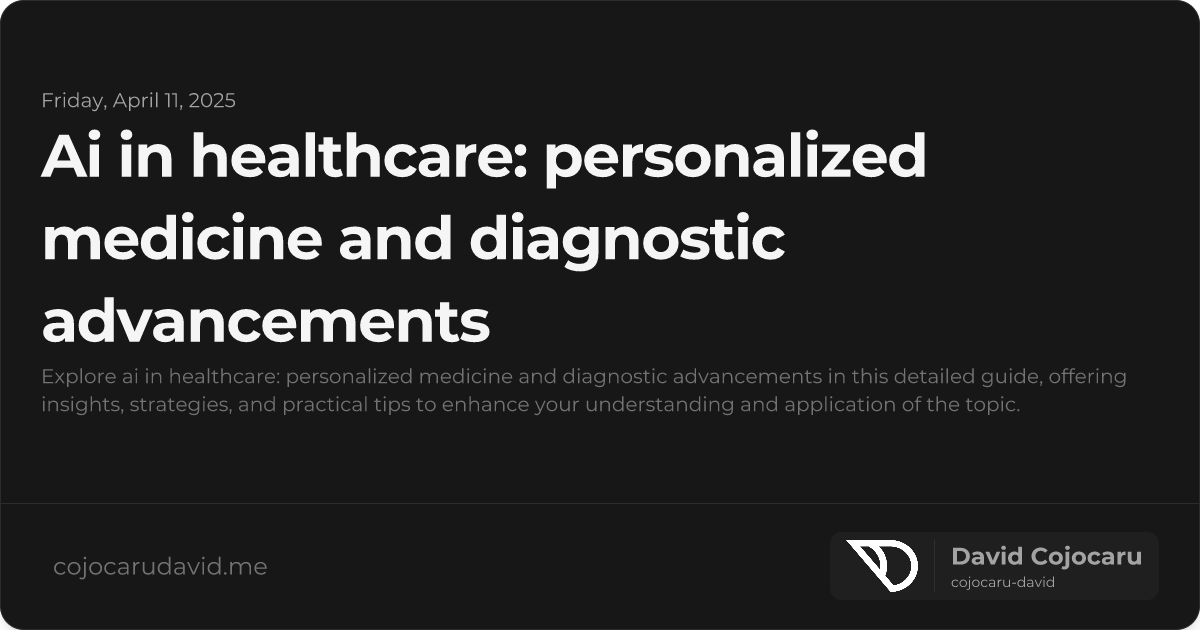Revolutionizing Healthcare: How AI is Powering Personalized Medicine and Advanced Diagnostics
Artificial intelligence (AI) is no longer a futuristic concept – it’s actively transforming healthcare. Specifically, AI is revolutionizing personalized medicine and diagnostic advancements, offering unprecedented opportunities to improve patient outcomes and the efficiency of medical practices. This blog post delves into the exciting ways AI is being used to create tailored treatment plans, enable earlier and more accurate diagnoses, and ultimately, improve the lives of patients.
Personalized Medicine: Tailoring Treatment with AI
Personalized medicine, also known as precision medicine, is about moving away from a “one-size-fits-all” approach to healthcare. It focuses on understanding individual genetic, environmental, and lifestyle factors to customize treatment. AI plays a pivotal role in accelerating this process by analyzing vast and complex datasets with remarkable speed and accuracy.
Key AI Applications in Personalized Medicine
-
Genomic Insights for Targeted Therapies: AI algorithms can analyze massive amounts of genomic data to identify specific genetic mutations linked to diseases. This information is invaluable for developing targeted therapies that address the root cause of the illness, minimizing side effects and maximizing effectiveness.
-
Accelerated Drug Discovery and Development: Traditional drug discovery is a lengthy and expensive process. Machine learning models can predict drug efficacy, potential side effects, and even identify promising new drug candidates, significantly speeding up the pharmaceutical development pipeline.
-
Optimized Treatment Plans Based on Individual Patient Profiles: AI can analyze a patient’s medical history, real-time health data (from wearables, for example), and genetic information to recommend highly personalized treatment plans. This proactive approach allows doctors to tailor treatment to the individual’s specific needs and circumstances.
AI-Driven Diagnostics: Enhancing Accuracy and Speed
AI is also making significant strides in diagnostic medicine, enhancing both accuracy and speed. By processing medical images, laboratory results, and electronic health records (EHRs) far faster than traditional methods, AI helps clinicians make more informed decisions quickly.
AI’s Impact on Medical Imaging
-
Enhanced Radiology: AI algorithms can detect subtle anomalies in X-rays, MRIs, and CT scans that might be missed by the human eye. This allows for earlier and more accurate diagnoses of conditions like tumors, fractures, and internal bleeding.
-
Precision Pathology: Deep learning models can analyze biopsy samples at a microscopic level, identifying cancerous cells with incredible accuracy. This reduces the risk of human error and helps pathologists make more confident diagnoses.
-
Revolutionizing Ophthalmology: AI algorithms can analyze fundus images of the retina to diagnose and monitor retinal diseases such as diabetic retinopathy, glaucoma, and age-related macular degeneration, leading to earlier intervention and vision preservation.
Early Disease Detection: Proactive Healthcare with AI
AI’s predictive capabilities are particularly valuable in early disease detection. By analyzing biomarkers and patient data, AI models can predict the likelihood of developing certain diseases before symptoms even appear.
-
Predictive Analytics for Risk Stratification: AI can identify individuals at high risk for developing conditions like heart disease, diabetes, or Alzheimer’s disease. This allows for proactive interventions, such as lifestyle changes or preventative medications, to delay or even prevent the onset of the disease.
-
Wearable Integration for Continuous Monitoring: AI can process data from wearable devices (smartwatches, fitness trackers, etc.) to monitor vital signs, sleep patterns, and activity levels. This data can be used to identify potential health issues early on, alerting users and their healthcare providers to take action.
Addressing the Challenges and Ethical Considerations
While the potential of AI in healthcare is immense, it’s crucial to acknowledge and address the associated challenges and ethical considerations.
-
Protecting Patient Data Privacy: Ensuring the security and confidentiality of patient data is paramount in AI-driven healthcare systems. Robust data governance policies and secure data storage solutions are essential.
-
Mitigating Bias in Algorithms: AI models are trained on data, and if that data is biased, the model will also be biased. It’s crucial to address disparities in training datasets to ensure that AI-powered healthcare solutions are equitable and do not perpetuate existing health inequalities.
-
Navigating Regulatory Approval Pathways: AI-based medical devices and treatments require rigorous testing and regulatory approval to ensure their safety and efficacy. Streamlined and transparent regulatory pathways are needed to facilitate the adoption of these innovative technologies.
The Promising Future of AI in Healthcare
The future of AI in healthcare is bright, with numerous exciting possibilities on the horizon.
-
AI-Assisted Robotic Surgeries: Robots guided by AI will enable surgeons to perform complex procedures with greater precision and accuracy, minimizing invasiveness and improving patient outcomes.
-
AI-Powered Virtual Health Assistants: AI chatbots can provide real-time medical advice, answer patient questions, and even triage patients, improving access to care and reducing the burden on healthcare providers.
-
Optimizing Population Health Management with AI: AI can analyze population-level data to predict disease outbreaks, identify health disparities, and optimize resource allocation, leading to more efficient and effective public health interventions.
Conclusion: Embracing the AI Revolution in Healthcare
AI is undeniably reshaping modern medicine, particularly in the realms of personalized medicine and diagnostic advancements. From tailoring treatments to individuals to enabling earlier and more accurate diagnoses, AI empowers clinicians and improves patient care in profound ways. As this transformative technology continues to evolve, a focus on ethical frameworks, robust data practices, and equitable access will be essential to ensure that AI’s benefits are realized by all.
“AI in healthcare isn’t about replacing human expertise; it’s about augmenting it, allowing healthcare professionals to focus on what they do best: providing compassionate, personalized care.”

